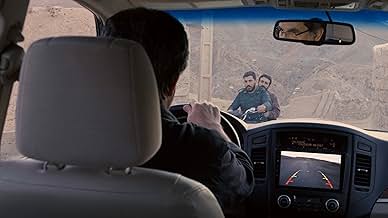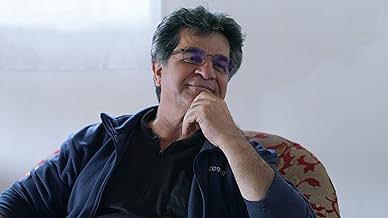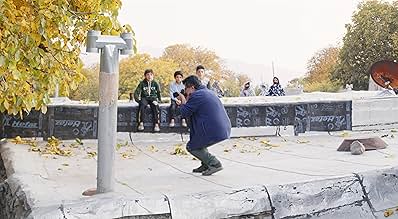ÉVALUATION IMDb
7,2/10
4,7 k
MA NOTE
Deux histoires d'amour parallèles alors que les partenaires sont contrecarrés par des obstacles cachés inévitables, la force de la superstition et les mécanismes du pouvoir.Deux histoires d'amour parallèles alors que les partenaires sont contrecarrés par des obstacles cachés inévitables, la force de la superstition et les mécanismes du pouvoir.Deux histoires d'amour parallèles alors que les partenaires sont contrecarrés par des obstacles cachés inévitables, la force de la superstition et les mécanismes du pouvoir.
- Prix
- 4 victoires et 8 nominations au total
Bakhtiyar Panjeei
- Bakhtiar
- (as Bakhtiar Panjei)
Narges Delaram
- Ghanbar's mother (Madar_e Ghanbar)
- (as Narjes Delaram)
Reza Heidari
- Reza
- (as Reza Heydari)
Aliye Tuzun
- Police
- (as Aliye Tüzün)
Avis en vedette
Film director Jafar Panahi is prohibited from leaving Iran, but is trying to make a film in neighbouring Turkey. In order to make that work, he moves to a remote village near the border, where the communications are a bit hit and miss. With the help of his obliging host "Ghanbar" (Vahid Mobaseri), though, he tries to make the best of it. Initially, it's a friendly village but when he takes (or doesn't!) a photograph of a young couple, he finds himself drawn into an increasingly acrid stand-off between two young men, and their families, to whom a girl may have been betrothed when her umbilical cord was cut. His frustrations with these encroachments are not helped by production difficulties with the two two stars of his documentary-style film - real life lovers who are trying to find a way to escape, safely, to Paris. There is the slightest hint of menace here as the plot develops and although we see little actual evidence, there is a distinct sense that this man is increasingly unwelcome, despite the platitudes from the villagers, encouraging a sixth-sense feeling that the authorities are distantly watching this film-maker. There is a distinct perception of intimidation! What is also clear is that these ordinary Iranian people live in fear of the police, the Revolutionary guard and that rather flies in the face of their genuine, peaceable and hospitable, nature. Now, perhaps Panahi's less-is-more style works for some, but for me I found this all rather a slow watch. He shuffles around with little useful dialogue to develop his on-screen persona, nor my interest in him. Clearly this is a story about freedom and a sort of subliminal oppression but somehow the characters themselves here didn't really develop that theme sufficiently, nor did they really engage me. The ending, too, is disappointing and inconclusive in equal measure and I was rather underwhelmed. The film does offer us an interesting depiction of rural life that probably hasn't changed in millennia, but somehow I felt little better than a fly on the wall with nowhere near enough to go on to join in. Perhaps just too much of this is predicated on a knowledge by the audience of this director and of his relationship with his government.
The movie "No Bears" has a sensitive and dramatic plot against the backdrop of political, religious, tradition, and cultural repression in the current Iranian world. There are two love stories told in parallel by the excellent director Jafar Panahi, who himself suffers military repression for his political movies that challenge the dictatorial Iranian government. Jafar Panahi manages to capture and transmit all the tension that Iranians suffer under the eyes of the so-called Cultural Police. We sense the pressure in the air and nobody wants to compromise or get involved or close to citizens considered traitors to the country and to the traditional customs.
Like many other incredible Iranian movies, "No Bears" is second to none in terms of quality. Simple in showing the daily life of a village and the background of filming a movie, but also bold in showing us what it's like to live in a repressive regime and not bend.
Like many other incredible Iranian movies, "No Bears" is second to none in terms of quality. Simple in showing the daily life of a village and the background of filming a movie, but also bold in showing us what it's like to live in a repressive regime and not bend.
A masterfully crafted film that showcases the incredible talent of Iranian director Jafar Panahi. Despite facing constant harassment and a six-year prison sentence on baseless charges, Panahi continues to push the boundaries of cinema with his deeply personal and thought-provoking work.
In "No Bears," Panahi plays a fictionalized version of himself as he directs a film remotely from the Iranian village of Joban, near Turkey. When his WiFi goes out, he becomes intrigued by a local ceremony and loans one of his cameras to a villager to document it. The film then follows two parallel tracks: the story of Bakhtiar and Zara, which serves as a reconstruction of a real-life event, and the recording of the ceremony, which opens up a can of worms in the village as it is used as evidence against a young woman accused of having premarital relations.
Throughout the film, Panahi deftly explores themes of truth-telling, social activism, and the blurred lines between reality and fiction. The acting is superb, with Bakhtiar and Zara's tumultuous relationship feeling both realistic and emotionally charged. The cinematography and direction are also top-notch, with the film's remote setting adding to its sense of isolation and tension.
Overall, "No Bears" is a powerful and thought-provoking film that showcases the resilience and determination of its director. It is a must-see for fans of Panahi's work and anyone interested in the intersection of art and politics.
In "No Bears," Panahi plays a fictionalized version of himself as he directs a film remotely from the Iranian village of Joban, near Turkey. When his WiFi goes out, he becomes intrigued by a local ceremony and loans one of his cameras to a villager to document it. The film then follows two parallel tracks: the story of Bakhtiar and Zara, which serves as a reconstruction of a real-life event, and the recording of the ceremony, which opens up a can of worms in the village as it is used as evidence against a young woman accused of having premarital relations.
Throughout the film, Panahi deftly explores themes of truth-telling, social activism, and the blurred lines between reality and fiction. The acting is superb, with Bakhtiar and Zara's tumultuous relationship feeling both realistic and emotionally charged. The cinematography and direction are also top-notch, with the film's remote setting adding to its sense of isolation and tension.
Overall, "No Bears" is a powerful and thought-provoking film that showcases the resilience and determination of its director. It is a must-see for fans of Panahi's work and anyone interested in the intersection of art and politics.
Director Jafar Panahi is midway in his imprisonment/house arrest in Iran, a victim of a relentless Islamic theocracy. That little matter hasn't kept him from making five films, sometimes using technology to direct remotely, for instance, his current "No Bears," in which he depicts himself directing a film within the film. Directing a Turkish town from a place near the Iranian border lends a romance to an otherwise mortally-dangerous enterprise.
His films show how he fights the restrictions of the regime on his art. All five in some way or another may reveal his oppression and lack of artistic autonomy. Panahi's films reflect his late mentor, Abbas Kiarostami, and his challenging tension between "narrative" and "documentary," when a camera seems to play between fiction and reality.
Because he hasn't been allowed to leave Iran for 10 years, his movies have a cachet usually relegated to an artistic outlaw: "This Is Not a Film," "Closed Curtain," "Taxi" and "3 Faces" are almost classics. New Yorker magazine says "No Bears" is one of the best dramas of the year, and they're right.
In No Bears, after a wild opening in which an exiled Iranian couple argue in the street about a corrupt passport and escape into Europe, we realize it's a scene from the movie he is remotely directing. Then we are thrown into a Romeo and Juliet mash up that leaves Panahi's director at the mercy of local forces, both official and citizenry, who lay tradition and family rumbling at his feet for a photo disc he allegedly has that would resolve a fight over an arranged marriage.
Panahi's director claims he has no such compromising photo of the couple, but he shows little respect for the local traditions inherent in the love affair. Underneath, of course, is his comment on cinema as a means of discerning truth in a culture of fake news. The scene of Panahi feverishly looking for cellphone reception smartly underscores the struggle to find truth.
At the least, No Bears is a profound statement about the power of filmmaking as it clashes with custom and reality. It is a masterful meta-fiction that tells a complicated cultural tale and the fraught participation of cinema. 80 for Brady it is not.
His films show how he fights the restrictions of the regime on his art. All five in some way or another may reveal his oppression and lack of artistic autonomy. Panahi's films reflect his late mentor, Abbas Kiarostami, and his challenging tension between "narrative" and "documentary," when a camera seems to play between fiction and reality.
Because he hasn't been allowed to leave Iran for 10 years, his movies have a cachet usually relegated to an artistic outlaw: "This Is Not a Film," "Closed Curtain," "Taxi" and "3 Faces" are almost classics. New Yorker magazine says "No Bears" is one of the best dramas of the year, and they're right.
In No Bears, after a wild opening in which an exiled Iranian couple argue in the street about a corrupt passport and escape into Europe, we realize it's a scene from the movie he is remotely directing. Then we are thrown into a Romeo and Juliet mash up that leaves Panahi's director at the mercy of local forces, both official and citizenry, who lay tradition and family rumbling at his feet for a photo disc he allegedly has that would resolve a fight over an arranged marriage.
Panahi's director claims he has no such compromising photo of the couple, but he shows little respect for the local traditions inherent in the love affair. Underneath, of course, is his comment on cinema as a means of discerning truth in a culture of fake news. The scene of Panahi feverishly looking for cellphone reception smartly underscores the struggle to find truth.
At the least, No Bears is a profound statement about the power of filmmaking as it clashes with custom and reality. It is a masterful meta-fiction that tells a complicated cultural tale and the fraught participation of cinema. 80 for Brady it is not.
Telling the truth is difficult for Iranian filmmakers. You have Government control on one hand (the real tale of Panahi remotely directing a film being shot in Turkey while stationed on the borders of Iran as he is not allowed to leave the country) and you have quaint traditions on the other (in the Iranian villages on the border) that often lead to tragedy. However good your intent, the road is bumpy and leads you to a sad, nihilistic end. Intelligent filmmaking that captures the difficulty of renowned filmmakers to capture the Kafkesque ground reality in Iran and the frustrations of Iranian nationals today. Deserved the Special Jury Prize at Venice.
Le saviez-vous
- AnecdotesActually, the entire scene shot in Istanbul Kadikoy, not in Turkish border town.
Meilleurs choix
Connectez-vous pour évaluer et surveiller les recommandations personnalisées
- How long is No Bears?Propulsé par Alexa
Détails
Box-office
- Brut – États-Unis et Canada
- 167 333 $ US
- Fin de semaine d'ouverture – États-Unis et Canada
- 6 173 $ US
- 25 déc. 2022
- Brut – à l'échelle mondiale
- 1 196 288 $ US
- Durée1 heure 46 minutes
- Couleur
- Rapport de forme
- 1.85 : 1
Contribuer à cette page
Suggérer une modification ou ajouter du contenu manquant
























